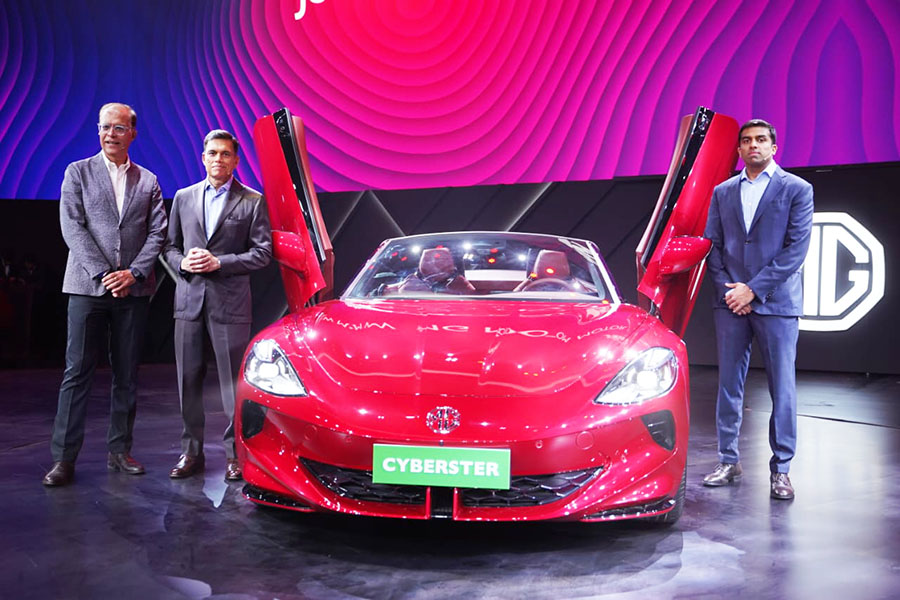
With MG, JSW wants to create a "Maruti moment for electric vehicles"
JSW's tie-up with MG Motor is a shot in the arm for India's fledgling electric vehicle industry
 SAIC Motor and JSW Group finalise automotive JV ‘JSW MG Motor India Pvt Ltd’.JPG( (L-R- Mr Rajeev Chaba, CEO Emeritus of MG Motor India, Mr Sajjan Jindal, Chairman of JSW Group, Mr Parth Jindal, Member of Steering Committee of JSW MG Motor India JV)
SAIC Motor and JSW Group finalise automotive JV ‘JSW MG Motor India Pvt Ltd’.JPG( (L-R- Mr Rajeev Chaba, CEO Emeritus of MG Motor India, Mr Sajjan Jindal, Chairman of JSW Group, Mr Parth Jindal, Member of Steering Committee of JSW MG Motor India JV)
If you can’t build it, it’s best to buy it. That’s the philosophy the JSW Group has adopted in entering India’s rapidly growing car market.
After months of negotiations, the company said it would enter into a wide-ranging tie-up with MG Motor to manufacture, market and distribute vehicles both for the Indian market as well as for exports. JSW will have a 35 percent stake in the joint venture. Crucially, the company gets access to MG Motor’s new powertrain technologies. It will also work towards setting up charging infrastructure across the country. Under the terms of the deal, JSW MG Motor India Pvt Ltd plans to launch a new vehicle every three to six months starting from the 2024 festive season.
“India is a $4 trillion economy today, while China reached that level in 2005 and the US in 1985,” said Parth Jindal, member of the steering committee of JSW MG Motor India Pvt Ltd. According to him, this is about the point when auto sales begin to take off and, just as China went from 4 million passenger vehicles in 2005 to 28 million today, India too could move from 4 million to 10 million by the end of this decade. He expects electric vehicles and hybrids to form a significant chunk of sales by then. “The focus will be on new energy vehicles,” he said, and added that the aim was to sell 1 million electric vehicles by 2030.
India’s electric vehicle industry has seen a flurry of activity of late. Tata Motors, which raised $1 billion for its electric vehicle arm Tata Passenger Electric Mobility in 2021, said the division has already achieved EBIDTA breakeven. The company plans to have as many as 10 electric vehicle models on the road by 2025. Tata Motors aims to sell 100,000 electric vehicles by 2024-25 up from 50,043 units in 2022-23. Electric two-wheeler sales were up 26 percent in January 2024 to 81,344 units compared to the same month last year, according to data from the Vahaan website.
The tie-up with MG Motor came as Chinese-owned SAIC Motor was on the lookout for an Indian partner to de-risk its business. India has upped the scrutiny on Chinese companies and SAIC wanted to protect its investments as well as toehold in the Indian market.
On JSW’s side was an abiding love for cars by Chairman Sajjan Jindal. He was 12 when he ‘made’ his first car and drove it around his family’s steel plant in Hisar, Haryana. He then got busy with the steel business and his dream of starting a car company relegated into the background.
Also read: MG Motor has had a decent run in India so far. Can Sajjan Jindal take it to the next level?
In 2015-16, when the first wave of electric vehicles and hybrids were launched in India, JSW thought this was the right time to explore entering the business. In 2017, the company put together a team to work on how they could enter the auto sector, but that was put on the backburner once Covid hit. When the MG opportunity came out, “We thought everything is coming together so why not try it out,” he said. Both companies did not disclose the financial contours of the deal.
Jindal promised that, just like with other JSW businesses, the company would make sure they achieved scale here too. “With MG, my dream is that we make this a Maruti moment for new energy vehicles,” he said, referring to how Maruti Suzuki had created the component manufacturer ecosystem around Gurugram in the early 1980s. At the launch, the company unveiled the Cyberster, a two-seater convertible with a 800 km EV range. The vehicle is expected to be launched in January.
The joint venture expects to start launching new models from the start of the festive season with a new launch every three to six months. Also on the cards is an expansion of its Halol facility from 100,000 to 300,000 cars annually.
To keep the sale price low, JSW-MG Motor would go in for deep localisation on both the car components as well as on the battery pack and battery management system. There are also PLI incentives that the company would be eligible to apply for. Jindal is also acutely aware of the lack of charging infrastructure in India resulting in range anxiety among drivers. According to him, most city cars travel no more than 100-150 km a day. For longer distances, plug-in hybrid electric vehicle (PHEV) technology would do the job. While JSW plans to set up charging stations across the country, Jindal didn’t offer details on the timeline.


















